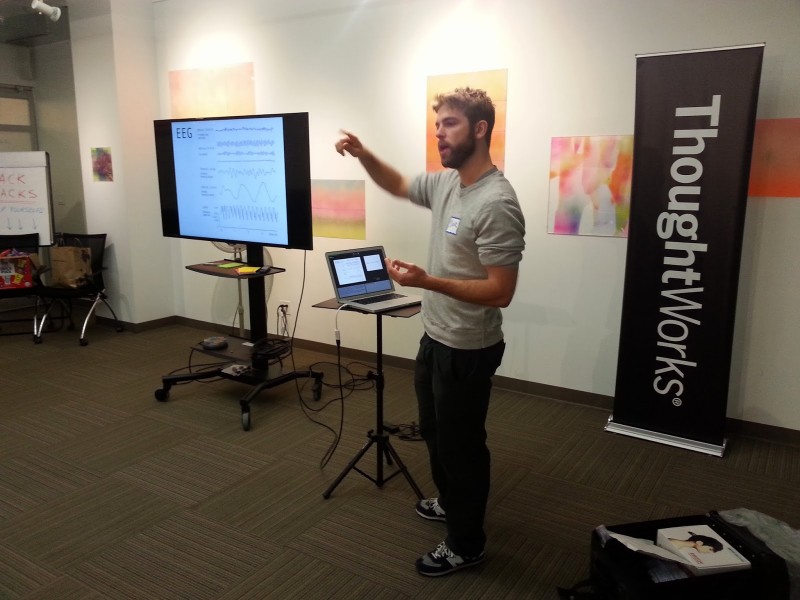
Robohub.org
Open Brain-Computer Interface: An Interview with Conor Russomanno

Brain-computer interfacing (BCI) is a rapidly growing field that offers huge potential for many applications, such as medical grade BCIs to help people with sensory-motor disabilities. Currently, a number of researchers are developing more affordable BCI systems designed to address a wider range of neurotherapeutic applications.
Conor Russomanno is the founder and research developer of OpenBCI, a low-cost open-source hardware platform that records the brain’s electrical signals and uses devices and software languages to make the data easily accessible. Russomanno and co-founder Joel Murphy aim to accelerate the advancement of BCI through collaborative hardware and software development.
The OpenBCI project began earlier this year after raising over $200K through a Kickstarter campaign (more than doubling their initial goal). Even in the early stages, OpenBCI is already drawing a lot of attention and is having interesting repercussions in the BCI world.
“There’s a lot of really exciting stuff that’s going to happen in the near future and in the not so distant future, but I think the one thing that we’re hoping to achieve with open BCI is to really lower the barrier of entry both in terms of educational materials and also cost,” says Russomanno.
http://youtu.be/a55_EfFtysc
A number of consumer-grade EEG devices that have a relatively low channel capacity are available, but higher quality, medical and research grade EEG systems are much more expensive than a standard OpenBCI kit, which makes them less accessible. One of the advantages of Russomanno’s and Murphy’s development is that whereas previously, one medical grade system was used in a classroom or research laboratory, now, the same amount of money can be used to acquire enough OpenBCI systems to provide every student with their own device.
“This is reflected in our consumer base. A huge proportion of our customers are students, graduate-level researchers and professors who want to use OpenBCI as a learning tool, explains Russomanno.
Another of OpenBCI’s exciting potentials is the fact that it is fully open source. Russomanno and Murphy are using a lot of their resources to create an infrastructure in which people are not just able to use the technology but can also share their experiences and connect with other people using the technology. This enables users to share tutorials, getting started guides and also their own individual projects. In this sense, the creators have not only provided a tool, they are also establishing a level of enthusiasm for an unprecedented unicentric development.
The fact that such enthusiasm is being drummed up in many sectors from academia to the business world, marks a big step for BCI. How far into the mainstream does OpenBCI have the potential to go?
“I think that to be realistic about the technology it’s important to realize that, especially in the commercial space, technology like this has a tendency to get mislabelled and misrepresented by media sources. When you see the catchphrase ‘mind controlled robot’ you think of someone sitting in a chair with electrodes plugged into their head having ultimate control over many, many dimensions of a robot’s functionality.” Says Russomanno.
In reality, however, in the current state, mind controlled robots, at least using OpenBCI, translates to looking at a flashing screen and having the frequency of the flashing induce a similar frequency in the brain, and then telling the robot to turn left.
“We’re are many steps away from wearing a device that knows what turning your car on, versus opening your door look like. So it’s important to be realistic about what the technology is capable of,” Russomanno explains.
Russomanno points out that for BCI to advance, it’s essential for people to work together. Although there is some competition within this space, he emphasizes the importance of cooperation. Progress from any one company is going to help the industry as a whole. People in tested in joining the OpenBCI community can buy the technology, make use of the many available resources and share their experiences and this will work toward pushing BCI forward into the future.
Image credit: 4bpblogspot.com
tags: BCI, BMI, c-Research-Innovation, human-robot interaction







